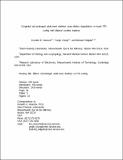| dc.contributor.author | Hancock, Kenneth E. | |
| dc.contributor.author | Chung, Yoojin | |
| dc.contributor.author | Delgutte, Bertrand | |
| dc.date.accessioned | 2014-03-20T15:42:48Z | |
| dc.date.available | 2014-03-20T15:42:48Z | |
| dc.date.issued | 2013-03 | |
| dc.date.submitted | 2012-11 | |
| dc.identifier.issn | 1525-3961 | |
| dc.identifier.issn | 1438-7573 | |
| dc.identifier.uri | http://hdl.handle.net/1721.1/85846 | |
| dc.description.abstract | Bilateral cochlear implant (CI) users perform poorly on tasks involving interaural time differences (ITD), which are critical for sound localization and speech reception in noise by normal-hearing listeners. ITD perception with bilateral CI is influenced by age at onset of deafness and duration of deafness. We previously showed that ITD coding in the auditory midbrain is degraded in congenitally deaf white cats (DWC) compared to acutely deafened cats (ADC) with normal auditory development (Hancock et al., J. Neurosci, 30:14068). To determine the relative importance of early onset of deafness and prolonged duration of deafness for abnormal ITD coding in DWC, we recorded from single units in the inferior colliculus of cats deafened as adults 6 months prior to experimentation (long-term deafened cats, LTDC) and compared neural ITD coding between the three deafness models. The incidence of ITD-sensitive neurons was similar in both groups with normal auditory development (LTDC and ADC), but significantly diminished in DWC. In contrast, both groups that experienced prolonged deafness (LTDC and DWC) had broad distributions of best ITDs around the midline, unlike the more focused distributions biased toward contralateral-leading ITDs present in both ADC and normal-hearing animals. The lack of contralateral bias in LTDC and DWC results in reduced sensitivity to changes in ITD within the natural range. The finding that early onset of deafness more severely degrades neural ITD coding than prolonged duration of deafness argues for the importance of fitting deaf children with sound processors that provide reliable ITD cues at an early age. | en_US |
| dc.description.sponsorship | National Institute on Deafness and Other Communication Disorders (U.S.) (NIDCD Grant R01 DC005775) | en_US |
| dc.description.sponsorship | National Institute on Deafness and Other Communication Disorders (U.S.) (NIDCD Grant P30 DC005209) | en_US |
| dc.language.iso | en_US | |
| dc.publisher | Springer Science+Business Media | en_US |
| dc.relation.isversionof | http://dx.doi.org/10.1007/s10162-013-0380-5 | en_US |
| dc.rights | Article is made available in accordance with the publisher's policy and may be subject to US copyright law. Please refer to the publisher's site for terms of use. | en_US |
| dc.source | Delgutte | en_US |
| dc.title | Congenital and Prolonged Adult-Onset Deafness Cause Distinct Degradations in Neural ITD Coding with Bilateral Cochlear Implants | en_US |
| dc.type | Article | en_US |
| dc.identifier.citation | Hancock, Kenneth E., Yoojin Chung, and Bertrand Delgutte. “Congenital and Prolonged Adult-Onset Deafness Cause Distinct Degradations in Neural ITD Coding with Bilateral Cochlear Implants.” JARO 14, no. 3 (June 2013): 393–411. | en_US |
| dc.contributor.department | Massachusetts Institute of Technology. Research Laboratory of Electronics | en_US |
| dc.contributor.approver | Delgutte, Bertrand | en_US |
| dc.contributor.mitauthor | Delgutte, Bertrand | en_US |
| dc.relation.journal | Journal of the Association for Research in Otolaryngology | en_US |
| dc.eprint.version | Author's final manuscript | en_US |
| dc.type.uri | http://purl.org/eprint/type/JournalArticle | en_US |
| eprint.status | http://purl.org/eprint/status/PeerReviewed | en_US |
| dspace.orderedauthors | Hancock, Kenneth E.; Chung, Yoojin; Delgutte, Bertrand | en_US |
| dc.identifier.orcid | https://orcid.org/0000-0003-1349-9608 | |
| mit.license | PUBLISHER_POLICY | en_US |
| mit.metadata.status | Complete | |
